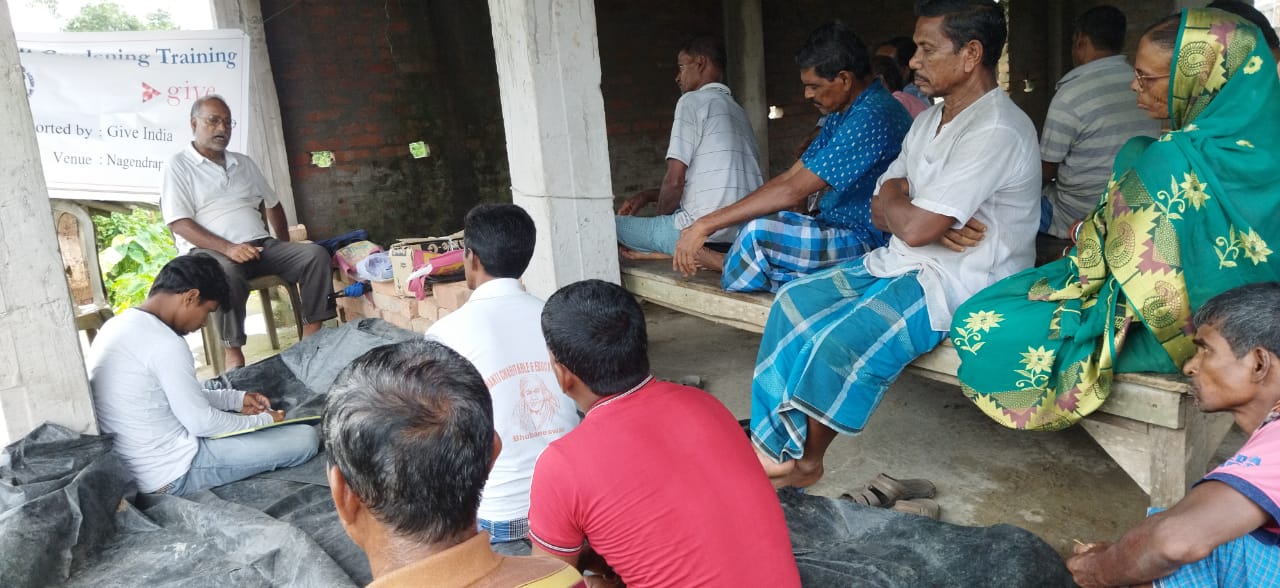

Give India Supported Mukti to organize Kitchen Gardening Training for the Covid-19 Affected Farmers
Sundarbans is in the remote southern part of deltaic West Bengal, India which is inhabited by over 4 million people where agriculture is the main source of livelihood. The twin tragedy of Covid-19 and Cyclone Yaas has severely affected this particular population. The inability to procure food due to unemployment and disrupted supply chains or access to social welfare schemes has also left this population at higher risk.

Mukti aims to enable farmers with skills that will boost productivity by emphasizing building long-term soil fertility, use of organic manure and appropriate cropping practices. This is to improve and maintain higher levels of yields, range of foods and some cash from the sale of surplus and designed agro-enterprises at the household level.
In doing so, Mukti in association with “Give India” organizing kitchen gardening training programs for the farmers of Sundarbans. The first session was held on 22nd September 2021, Wednesday at Nagendrapur Sakher More under Nagendrapur GP, Mathurapur II block where 28 farmers participated in the training program.

Mukti expresses heartiest gratitude to “Give India” to enhance the knowledge of the organic farmers by organizing training programs for them.
Mukti intends to build the communities’ own capacity to improve their livelihoods. This is done by mobilization and farmer education as well as assisting them to adopt the techniques. A successful adoption ensures that the know-how is internalized in the community for further spread among the farmers meaning that they can uphold the system for as long as they practice farming, without a compromise on yield and the quality of food, soil health and natural environment.
This project comes at a time when farmers are hardest hit by the effects of climate change and therefore need to be thoroughly equipped for their resilience, adaptation and contribute meaningfully to mitigation of the setbacks. It targets to work with the farmers to build and fine-tune their capacity in managing farm resources and emphasizing composting as a basic component to build long-term soil fertility and establish rich family kitchen gardens for each participating household. This will go a long way to improving the food/nutrition security as well as raise the incomes by growing own food as opposed to market reliance and selling of the surpluses.
The beneficiaries thanked “Give India” for supporting them in their hard times. They said that they are grateful to Give India for providing them the training on how to make homegrown vegetables (kitchen garden) using organic methods. The use of chemical fertilizers is causing a lot of damage to crops as well as poisoning the human body. Give India is teaching them the techniques of how to use organic fertilizer. They will learn and use it. They welcome this joint venture of Mukti and Give India.
Project Activities
- About Mukti (2)
- Accreditation (31)
- AGM (63)
- Agriculture Reforms (16)
- ahm2017 (4)
- ahm2017news (2)
- ahm2017runners (2)
- ahm2018runners (1)
- Ambulance Service (2)
- Amplifying Community Voices (9)
- Awards (22)
- Awareness and Empowerment (13)
- Awareness drives (1)
- Book-Bank (13)
- Careers (8)
- CARR (32)
- Ccp1011 (4)
- Chick Rearing Programme for Marginalised Women (5)
- Climate Resilience River Embankment (1)
- Coaching Center (102)
- Community Clinic (2)
- COVID19 (62)
- Cyclone Amphan Relief and Rehabilitation (129)
- Cyclone Bulbul Relief (30)
- Cyclone Relif (2)
- Cyclone Yaas Relief and Rehabilitation (68)
- Editorial (21)
- Editorial by Abir Biswas (1)
- Editorial by Ankita Kothiyal (1)
- Editorial by Kasturi Bakshi (1)
- Editorial by Prof. Pradeep Ray (1)
- Editorial by Ranitendranath Tagore (1)
- Editorial by Sankar Halder (10)
- Editorial by Satyajit Ray (3)
- Editorial by Sohini Mehta (1)
- Editorial by Soumitra Bose (1)
- Editorial by Subhankar Basu (1)
- Education and Enrichment (34)
- Environment and Resilience (9)
- Essential Items Distribution (19)
- Fair/Exibition (1)
- Featured Activities (10)
- Go Green (81)
- Gram Clinic (2)
- Green (20)
- Health (8)
- Health Water & Sanitation (17)
- Hello Beta (1)
- Impact Stories List (31)
- Integrated Development (11)
- Jal hi Kal (2)
- Kerala Flood Relief (3)
- Kitchen Gardening (2)
- Livelihood & Enablement (20)
- Marathon (13)
- MCDF (14)
- Mcdf (112)
- Mcom (6)
- Medical Camp (8)
- MIT (3)
- MKSS (6)
- MSS (11)
- MUKTI Community Shop (1)
- Mukti Craft (2)
- Mukti Cultural (1)
- Mukti Employment (2)
- Mukti Fresh (2)
- Mukti Gram - Egra (2)
- Mukti Gram - Purbashridharpur (8)
- Mukti Gram, Model Village (136)
- Mukti Green (6)
- MUKTI Institute of Technology (MIT) (3)
- Mukti Kishalaya (2)
- Mukti Support (1)
- Mukto Dhara (1)
- NaRKEL (9)
- Obituaries (4)
- Observance Days Celebration (10)
- Organic Farming (3)
- Organic Farming & Training Support (8)
- Pandemic Support (2)
- Pond Rejuvenation (1)
- Prerana (4)
- Projects For Mukti Wide (3)
- Rights and Special Needs (19)
- Riste (2)
- RTI (14)
- Sahosini (3)
- SAM (9)
- Sam (89)
- SDF (9)
- Skill & Enterprise Development (2)
- Skill Enterprise (2)
- star-of-the-week (9)
- STEP (1)
- Success Stories (39)
- Success Story Coaching Center (1)
- Success Story MCDF (6)
- Success Story RTI (1)
- Success Story SAM (9)
- Success Story TSS (20)
- Sundarbans Green (SUN-G) (1)
- Sunderban development fair project (7)
- Sustainable Agriculture (2)
- SWAS (2)
- SwasthoSongini (4)
- Swavlamban Accelerator in Sundarbans (SWAS) (2)
- Talented (2)
- Tour for Cause (31)
- TSK25 2017 (7)
- TSK25 2017 Runners (7)
- TSS (17)
- TSS (112)
- Uncategorized (59)
- Valued Partners (3)
- Vclpk (1)
- Vetp (2)
- View (2)
- VOICE (2)
- workshop (109)